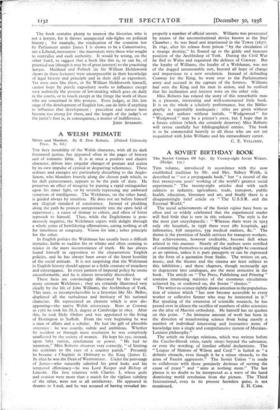A WELSH PRIMATE
THE fiery instability of the Welsh character, with all its dark frustrated genius, has appeared often in the pages of history and of romantic fable. It is at once a positive and elusive character, driven into singular changes of posture and action by its own impulse of cynical or despairing vehemence. These ardours and energies are particularly disturbing to the Anglo- Saxon, who blunders bravely along the chosen path which, to his dull perseverance, appears to be the path of duty. He preserves an effect of integrity by putting a rapid extinguisher upon his inner light, or by severely repressing any awkward symptom of intelligence. The Welshman, on the other hand, is guided always by intuition. He does not set before himself any illogical standard of consistency. Instead of plodding along the path he prances unrepentantly into the open field of experience ; a cause of dismay to others, and often of bitter reproach to himself. Thus, while the Englishman is pon- derously negative, the Welshman capers with delight through a whole series of bewildering affirmations, caring nothing at all for timeliness or congruity. Vision for him ; sober principle for the other.
In English politics the Welshman has usually been a difficult intruder, liable to sudden fits or whims and often seeming to rejoice in the mere inconvenience of truth. He has always found himself in opposition to the characteristic English policies, and he has always been aware of the latent hostility of the social attitude. It is not surprising that the Welshman in English history should appear as a fickle creature of treachery and extravagance. In every pattern of imperial policy he seems unconformable, and he is almost invariably discredited.
These facts are convincingly illustrated by the lives of many eminent Welshmen; they are certainly illustrated very clearly by the life of John Williams, the Archbishop of York. This man, so incomprehensible to a historian like Mr. Belloc, displayed all the turbulence and intricacy of his national character. He represented an element which is now dis- appearing—the native Welsh aristocracy. Born at Conway in 1582 he tot& his M.A. degree at Cambridge in 1605. After this, he took Holy Orders and was appointed to the living of Honington in Suffolk. From the very beginning he was a man of affairs and a scholar. He had the gift of plausible utterance : he was courtly, subtle and ambitious. Whether by accident or through mere resolution he was completely unaffected by the society of women. He kept his eye, instead, upon lofty station, emolument or power. "He had no intention," Miss Roberts observes very correctly, "of limiting his activities to the cure of a country parish." Presently he became a Chaplain in Ordinary to the King (James I). In 1620 he was the Dean of Westminster. Under the patronage of James—who naturally admired his good looks and his tempered effeminacy—he was Lord Keeper and Bishop of Lincoln. His first relations with Charles I, whose guile and evasion were more than a match for the vigilant subtlety of the other, were not at all satisfactory. He appeared in dreams to Laud, and he was accused -of having revealed im-
properly a number of official secrets. Williams was prosecuted by means of the unconstitutional device known as the Star' Chamber ; he was fined and imprisoned in the Tower (1637). In 1641, after his release from prison "by the circulation of a strange destiny," he floated up to the giddy and insecure position of the Archbishop of York. During the Civil War he fled to Wales and organised the defence of Conway. But the loyalty of Williams, the loyalty of a Welshman, was not of the dogged unreasonable sort, beyond all hope of change and impervious to a new revelation. Instead of defending Conway for the King, he went over to the Parliamentary army and assisted in the capture of the fortress. Williams had seen the King and his men in action, and he realised that his inclination and interest were on the other side.
Miss Roberts has related the story of this remarkable man in a pleasant, interesting and well-constructed little book. It is on the whole a scholarly performance, but the Biblio- graphy is regrettably inadequate : titles are given without dates, and authors without initials. " Wedgewood " for " Wedgwood " may be a printer's error, but I hope that in a future edition (which she certainly deserves) Miss Roberts will revise carefully her bibliographical entries. The book is to be commended heartily to all those who are not yet acquainted with John Williams and his extraordinary career.
C. E. VULLIAMY.


































 Previous page
Previous page